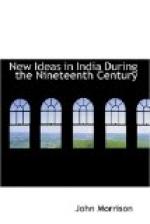Raja Rammohan Roy, the brave man who made a voyage to Britain in defiance of caste, the champion of the widow who had often been virtually obliged to lay herself on her dead husband’s pyre, the strenuous advocate of English education for Indians, the supporter of the claim of Indians to a larger employment in the public service, has not yet received from New India the recognition and honour which he deserves. To every girl, at least in Bengal, the province of widow-burning, he ought to be a hero as the first great Indian knight who rode out to deliver the widows from the torturing fire of Suttee.
[Sidenote: Service of the Br[=a]hma Sam[=a]j to India.]
As its theistic name implies, the Br[=a]hma Sam[=a]j professedly represents a movement towards theism, i.e. a rise from the polytheism and idolatry of the masses and a rejection of the pantheism of Hindu philosophy. Of course, noteworthy though it be, the foundation of the Br[=a]hma Sam[=a]j in 1828 was not the introduction of monotheism to India. In the Indian Christian Church and in Mahomedanism, the doctrine of one, personal, God had been set forth to India, and in one of the ancient Hindu philosophical systems, the Yoga Philosophy, the same doctrine is implied. But in India, Christianity and Mahomedanism were associated with hostile camps; the Yoga Philosophy was known only to a few Sanscrit scholars. In Br[=a]hmaism, the doctrine of one personal God became again natural naturalised in India. That has been its special service to India, to naturalise monotheism and many social and religious movements. For in India, things new and foreign lie under a peculiar suspicion. In the social sphere, the Br[=a]hma Sam[=a]j repudiates caste and gives to women a position in society. As Indian theists also, when their first church was opened in 1830, they gave the Indian sanction to congregational worship and prayer, “before unknown to Hindus.” For, the brahman interposing between God and the ignorant multitude, the Hindu multitude do not assemble themselves for united prayer, as Christians and Mahomedans do; and at the other end of the Hindu scale, the professed pantheist as such cannot pray. In proof of the latter statement, we recall the words of Swami Vivekananda, representative of Hinduism in the Parliament of Religions at Chicago in 1893, in a lecture “The Real and the Apparent Man,” published in 1896. “It is the greatest of all lies,” he writes somewhat baldly, although one is often grateful for a bald, definite statement, “that we are mere men; we are the God of the Universe.... The worst lie that you ever told yourself is that you were born a sinner.... The wicked see this universe as a hell, and the partially good see it as heaven, and the perfect beings realise it as God Himself.... By mistake we think that we are impure, that we are limited, that we are separate. The real man is the One Unit Existence.” Prayer is therefore irrational for a pantheist, for no man is separate from God.




